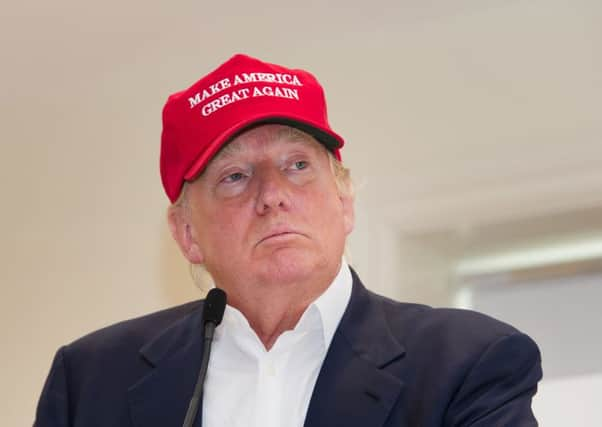Brian Monteith: Anti-establishment appeal is Trump card


The reason that this question is so often asked tells us something about the nature of what is happening in the United States. Even old-school time-served establishment Republicans are mystified.
The answer to why Trump is doing so well in the nomination race – winning “super Tuesday” this week to have the backing of more states behind him – is the same as why so many people cannot believe it is happening. For all his wealth, Trump is not part of the US establishment in Washington. Those that control politics now sense their control slipping away from them.
Advertisement
Hide AdAdvertisement
Hide AdThis mere fact upsets a lot of people as it shakes the very foundations of how they think the US should work, how politics should work and how candidates like Trump should normally be destroyed in the glare of media analysis before this point in the process.
One of the reasons that Barack Obama was so popular in 2008 was that to many people he did not appear to be a member of the Washington establishment. Being a person of colour immediately gave him an edge over Hillary Clinton when seeking the Democratic nomination and that advantage was maintained against the Republican candidate, John McCain, in the Presidential election itself.
Anyone who cared to study closely the battles of Obama against Clinton and then Obama against McCain would have quickly identified that Obama and Clinton were both establishment people and that McCain was the real outsider.
Obama was the partisan machine politician with Chicago training that had worked the Washington circuit, while McCain was the trouble-making bi-partisan senator that the Republican Party did not trust.
Advertisement
Hide AdAdvertisement
Hide AdTo her own disadvantage Hillary Clinton’s greater establishment pedigree helped make Obama look the outsider seeking to change the US and then the world. This made Obama more alluring, more attractive, and many people, especially young people, rallied around the hope he gave them. The fact that so many young people have rallied around the radical democratic-oldster Bernie Sanders, rather than support Clinton tells us just how much Clinton has a problem connecting with young voters and how much of a failure President Obama has been.
The “audacity of hope” that Obama displayed in his two elections was to suggest he was a going to change things for the better because he was an outsider. It was little more than theatre, vaudeville even. Eight years on and a new generation is so discouraged with his lack of achievements that many have been investing their hope in an older man to challenge Hillary Clinton and finally get “the change we need”.
In normal circumstances this Democratic cage fight would have been drawing huge attention away from the Republicans, who only a year ago were written off, as a Clinton Presidential victory was thought a certainty. Not any more, and it’s all thanks to Donald Trump.
Just as Obama appeared to be anti-establishment because of his colour, relatively low profile on “the Hill” and distance from Wall Street – so Trump appears anti-establishment because he verbally assaults anyone and everyone with his caustic tongue. All Republican opponents are considered fair game, no matter how strong their right-wing credentials or how impressive their electoral record. All right wing media are considered worthy of attack no matter how much they have derided Obama and Clinton.
Advertisement
Hide AdAdvertisement
Hide AdAnd yet Trump can be found in the past schmoozing with the political great and the good of all parties – including the Clintons – as they wanted to associate with his success – and he with theirs. Instead of working against him, Trump’s great wealth is seen as a strength – for he is able to argue he cannot be bought by corporate lobbyists and be beholden to the people in Wall Street that are blamed for the economic crash of 2007-08.
Indeed, he is even able to say that because he has in the past lost a great deal too he has his own reasons to distrust government and big corporates.
As an unlikely anti-establishment figure Trump is able to appeal to coloured voters in the US on issues of immigration and border control just as he appeals to the swathes of small-town Americans who distrust Washington and all they belive it stands for – corruption, greed and putting themselves before their country.
Trump’s “Making America Great Again” is almost certainly a slogan without thought-through policies – but that does not matter. Very unlikely people, be it surprising minorities or unspoken quiet voters, believe seriously that Trump is on their side and will tell the talkers of Washington BS to get out the way as he rebuilds the country. What that country might look like – other than have a fence between the US and Mexico is hard to say. Trump probably doesn’t know himself.
Re-establishing the American dream is the goal, to stop Trump, Hillary Clinton will have to show how she would do that when many would say she has been part of the problem.